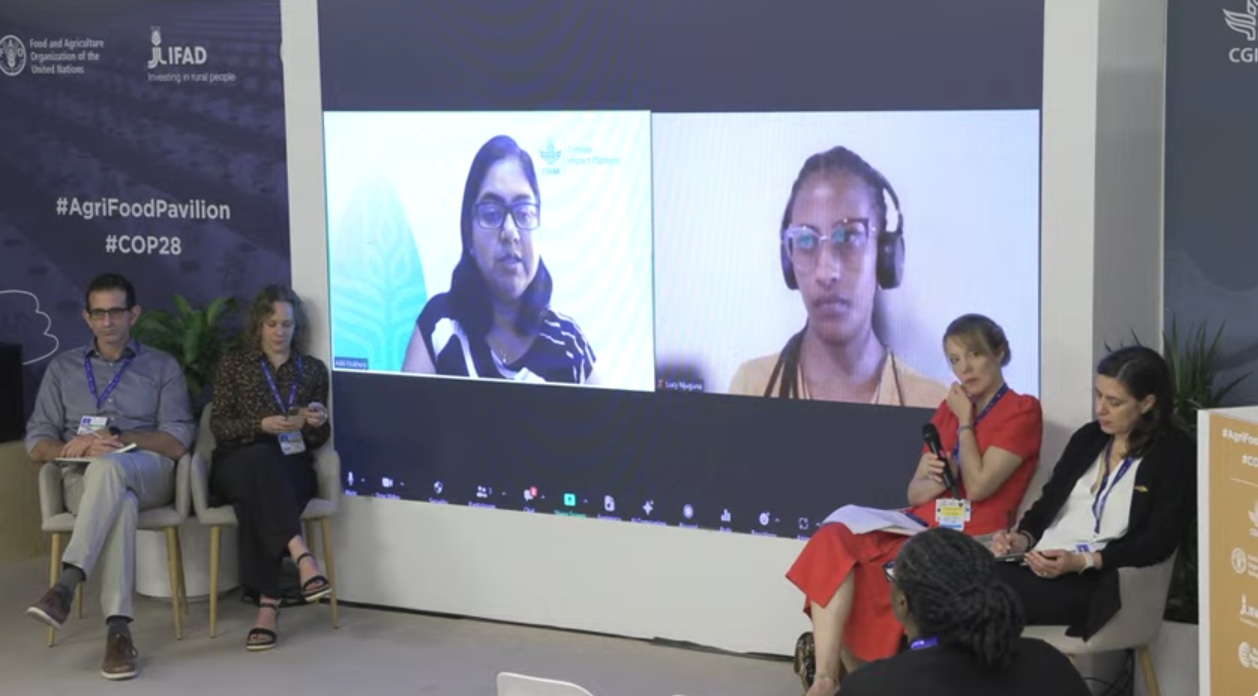
Fostering demand-driven and practical approaches to tracking the Global Goal on Adaptation– 11 Dec
Core message
Event Summary
Effective and results-oriented adaptation strategies are crucial for the rapid adjustment of food systems to climate change challenges. In 2015, countries established the Global Goal on Adaptation (GGA), a common objective focusing on enhancing adaptive capacity and resilience while reducing vulnerability to climate change. However, until this COP, there has been no consensus on frameworks, methods, indicators or metrics to assess progress towards the GGA.
Simultaneous with the negotiations on creating such frameworks for the GGA, the event titled 'How can goals and targets accelerate adaptation and unlock finance? Fostering demand-driven and practical approaches to tracking the Global Goal on Adaptation,' held on 11 December at the Food Systems Pavilion, explored ways to track and optimize adaptation efforts. Key outcomes included heightened awareness of adaptation goals, improved stakeholder dialogue, and knowledge exchange on inclusive adaptation tracking in food systems. The event stressed the importance of aligning global objectives with practical, localized actions and emphasized the urgent need for efficient Monitoring, Evaluation, and Learning (MEL) systems. The event catalyzed action, advocating for ambitious, credible and robust approaches to address climate change challenges.
‘The GGA targets are crucial; they must be effective, setting the stage for the actions of practitioners, financing mechanisms, and the priorities of countries. It is imperative to get this right—strong ambition, credibility, and robustness are key.’ - Cristina Rumbaitis del Rio, Senior Advisor, Adaptation and Resilience, UN Foundation
Key Takeaways
1. There is a critical need for agreed-upon frameworks, methods, indicators and metrics to assess progress towards the Global Goal on Adaptation (GGA), emphasizing the necessity of a structured approach to measure and track adaptation efforts.
2. Notable outcomes highlighted the importance of inclusive adaptation tracking in food systems, signaling a shift towards incorporating diverse perspectives and practices in monitoring and evaluating adaptation strategies.
‘Elevating voices involves ensuring representation from the Global South. Acknowledging the cost of adaptation, it is crucial that this burden is not borne downstream, as this would impede progress in adaptation rather than contribute to desired results.’ - Steve Prager, Senior Program Officer for Agriculture Transformation Strategy, Bill and Melinda Gates Foundation
3. Emphasizing the alignment of global objectives with practical, localized actions, the event stressed the significance of adapting strategies that are both ambitious and tailored to the specific needs and contexts of local communities.
‘We urgently require improved systems for local authorities, communities, and national governments to assess effective adaptation strategies tailored to specific needs. Timely implementation of these systems is crucial for making informed decisions in adaptation efforts.’ - Emilie Beauchamp, Lead, Monitoring, Evaluation and Learning, International Institute for Sustainable Development
4. The event highlighted the urgent need for efficient Monitoring, Evaluation, and Learning (MEL) systems, emphasizing the establishment of robust frameworks for assessing and learning from adaptation efforts to inform evidence-based decision-making and continuous improvement in climate change adaptation strategies.
‘What constitutes resilience varies from person to person, highlighting the need for specificity. The value lies in building upon existing work, underscoring the importance of adaptation tools for effective tracking in diverse contexts.’ - Lucy Njuguna, Post-doctoral Fellow, Climate Action Lever, CGIAR
Looking Forward
Upon confirmation of the second draft of the document, the initiation of a two-year work program to develop indicators for the GGA is anticipated. The next step will involve convening experts and stakeholders to collaboratively define and establish indicators, ensuring a comprehensive approach to measuring progress in adaptation measures.
Watch a recording of the full session here.